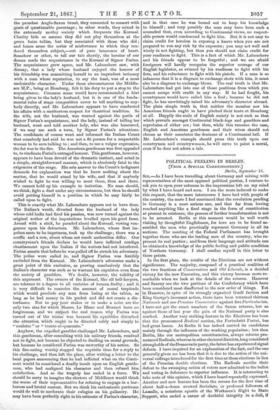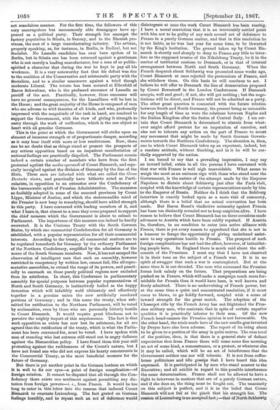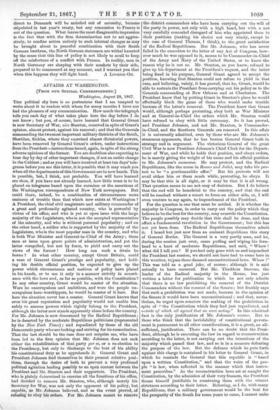POLITICAL FEELING IN BERLIN.
[FROM A SPECIAL CORRESPONDENT.]
Berlin, September 15. Sin,—As I have been travelling about Germany and mixing with representatives of the•most opposed political parties, I venture to ask you to open your columns to the impressions left on my mind by what I have heard and seen. I am the more induced to make this request, that the more intercourse I have had with people of the country, the more I feel convinced that the revolution pending in Germany is a most serious one, and that far from having reached anything like a final stage in the form of constitution at present in existence, the process of further transformation is not to be arrested. Berlin at this moment would be well worth visiting by thoughtful Englishmen, for here are to be found as- sembled the men who practically represent Germany in all its sections. The meeting of the Federal Parliament has brought together those who are the leading men of the country, who re- present its real parties ; and from their language and attitude oan be obtained a knowledge of the public feeling and public condition of Northern Germany. I shall confine myself in this letter to these points.
In the first place, the results of the Elections are not without significance. The majority, composed of a practical coalition of the two fractions of Conservatives and Old Liberals, is a decided victory for the new Executive, and this victory becomes more re- markable when we look at the details of the returns. Hanover and Saxony are the two portions of the Confederacy which have been considered most disaffected to the new order of things. Yet in Hanover, in spite of its strongly organized Guelf faction and King George's incessant action, there have been returned thirteen Nationals and one Prussian Conservative against five Particularists. I have not got the exact numbers of the Saxon returns, but as against those of last year the gain of the National party is also marked. Another very striking feature in the Elections has been that the pronounced Radical section, the Fortsehritt I'artei, has had great losses. At Berlin it has indeed carried its candidates mainly through the influence of the working population ; but then Berlin, like our metropolitan constituencies, always returns pro- nounced Radicals, whereas in other electoral districts, long considered strongholds of theDemocratic party, the latter has experienced signal defeats. I have inquired for an explanation of the fact, and the one generally given me has been that it is due to the action of the uni- versal suffrage introduced for the first time at these elections in lieu of the Prussian double elections. The Radicals ascribe their defeat to the swamping action of voters now admitted to the ballot and voting in deference to superior influence. It is interesting to take note of this opinion, which I have heard repeatedly expressed. Another and new feature has been the return for the first time of about half-a-dozen avowed Socialists, or professed followers of Lasaalle, a notorious apostle of the Workmen's Right to State Support, who ended a career of doubtful integrity in a dull, if not scandalous manner. For the first time, the followers of this very unscrupulous but uncommonly able demagogue have ap- peared as a political party. Their strength lies amongst the factory population in Silesia, in Saxony, and in the Rhenish pro- vinces, the seat of a large manufacturing industry. The artisan, properly speaking, as, for instance, in Berlin, is Radical, but not Socialist. No Lassalle candidate has ever been spoken of in Berlin, but in Silesia one has been returned against a gentleman who is not merely a leading manufacturer, but a man of so public- spirited a character that during the war he kept in pay all his workmen. It is a very noteworthy fact that his defeat was due to the coalition of the Conservative and aristocratic party with the Socialists, and to a similar manceuvre against a tried though moderate Liberal. The return has been secured at Elberfeld of Baron Schweitzer, who is the professed successor of Lassalle as pontiff of the sect. Practically, however, these successes will have no general consequences, for the Lassallians will be lost in the House; and the great majority of the House is composed of men who are adverse to wild theories of all kinds, and who, profoundly impressed with the magnitude of the task in hand, are resolved to support the Government, with the view of giving it strength to carry through the work of unification, which is the one object at heart with all genuine Germans.
This is the point at which the Government will strike upon an element of immense strength or of proportionate danger, according se it may bear itself with more or less resoluteness. Now, there eau be no doubt that as things stand at present the prospects of any serious opposition based on an impatient manifestation of national feelings are practically dispelled.. The Parliament counts indeed a certain number of members who have from the first protested against the modus operandi of Count Bismarck, and espe- cially inveighed against the division of Germany by the line of the Main. These men are infected with what are called the Gross Deutsche views, and practically have hitherto acted as Perth cttlarists, in opposition to an extension over the Confederacy of the bureaucratic spirit of Prussian Administration. The measures so foolishly adopted in some of the annexed provinces by Count Lippe, Minister of Justice, and which the statesmanlike mind of the Premier is now busy in remedying, should have added strength to this party. I have conversed with leading members of it, and what I learn is, that almost to a man they come prepared to support the chief measure which the Government is about to submit to Parliament. The importance of this measure can indeed be hardly overrated. It is the Customs Treaty with the South German States, by which one commercial Confederation for all Germany is entablished, with a popular representation for all their commercial interests. According to the treaty, all commercial matters are to be regulated henceforth for Germany by the ordinary Parliament of the Northern Confederacy, amplified by the admission for the nonce of the South German members. Now, it has not escaped the observation of intelligent men that such an assembly, however restricted in competency by written law, cannot fail, like all repre- sentative assemblies, to extend the range of its powers, and practi- cally to encroach on those purely political regions now excluded from its attributes. In short, this Conference in parliamentary assembly for special purposes between popular representatives of North and South Germany, is instinctively hailed as the happy invention which will infallibly weld ultimately and effectively together in a genuine union the now artificially sundered portions of Germany ; and in this sense the treaty, when sub- mitted for ratification to the Northern Parliament, will be voted by acclamation, even by those who are personally bitterly hostile to Count Bismarck. It would require great blindness not to perceive the mighty import of this acquiescence. The fact is that such opposition as exists has now lost its substance, for all are agreed that the ratification of the treaty, which is what the Parlia- ment has been convened for, must be voted. I have spoken with men of standing who last autumn still stood out in angry defiance against the Bismarckian policy. I have found them this year still protesting against the recklessness of the Count's nature, but I have not found one who did not express his hearty concurrence in the Commercial Treaty, as the most beneficial measure for the future of Germany.
But there is yet another point in the German horizon on which it is well to fix our eyes—a point of foreign complication—of foreign relation. It cannot be disputed that all through the Con- federacy there exists one sentiment against permitting any dic- tation from foreign powers—i. e., from France. It would be too long to enter in this letter into the reasons that induced Count Bismarck to evacuate Luxemburg. The fact grated on German feelings horribly, and to repeat such an act of deference would disintegrate at once the work Count Bismarck has been rearing. I have a moral conviction that it is an irrevocably settled point with him not to be guilty of any such second act of deference to France in a purely German matter, and that in this resolution he is not liable, as he was last year for seine time, to be thwarted by the King's hesitation. The ground taken up by Count Bis- marck is shortly and sharply to deny to France any title to inter- fere as the supposed trustee of the Nikolsburg Treaty, be it in the matter of territorial cessions to Denmark, or in that of internal arrangement between North and South Germany. When the French despatch about Schleswig was presented some weeks ago, Count Bismarck at once rejected the pretensions of France, and she withdrew them. On this basis be will continue to act. I believe he will offer to Denmark the line of demarcation proposed by Count Bernstorff in the London Conferences. If Denmark accepts, well and good ; if not, she will get nothing ; but the nego- tiations will be direct, and France will not be admitted as a party. The other great question is connected with the futere relation between South and North Germany, the present being as untenable for any length of time as were the relations between Naples and the Italian Kingdom after the fusion of Central Italy. I am cer- tain that Count Bismarck is determined to abstain from what- ever might afford pretext for an imputation of coercion, and also not to tolerate any action on the part of France to arrest any movement that might be made by South German Govern- ments towards the Northern Confederacy. The situation is, then, one in which Count Bismarck takes up an expectant, indeed, but a resolute attitude, without flinching, and in it he will be cor- dially supported by the nation.
I am bound to say that a prevailing impression, I may say an inward belief, exists in all the persons I have conversed with that war with France is well nigh unavoidable. What seems to weigh the most as an ominous sign with those who stand near the Government, is the nature of the attempt made by the Emperor Napoleon to dictate about Schleswig just after the Paris visit, coupled with the knowledge of certain representations made by him to the Emperor of Russia. Neither do I think that the Salzburg interview is exactly looked upon as a mere visit of ceremony, although there is a belief that no actual convention has been made. But Baron Beust's vindictive animosity against Prussia has been too distinctly revealed not to keep suspicion alive. I have reason to believe that Count Bismarck has on three occasions made advances to Austria which have been coldly repulsed. If Austria be, therefore, in no condition to enter into active alliance with France, there is yet every reason to apprehend that she is not in a humour to forego the opportunity of giving underhand assist- mice to any operations hostile to Prussia. The prospect of such foreign complications has not had the effect, however, of intimidat- ing people here. In England there is much said about the self- conceit of the Prussians. I must say that I have not observed it in their tone on the subject of a French war. It is in no spirit of swagger that such a war is contemplated. But at the same time it is not dreaded. The men who command the Prussian forces look calmly on the future. That preparations are being pushed on in France, which will make a campaign much more for- midable for Prussia than it would have been, is well known and freely admitted. There is no undervaluing of French power, but at the same time a quiet and concentrated resolution, if it must come to blows, to go boldly forward, coupled with a sense of inward strength for the great match. The adoption of the Chassepot rifle by the French Army has not frightened the Prus- sian military men, who maintain that in spite of certain superior qualities it is practically inferior to their arm. Of the new French hand-cannon the Prussian opinion is not favourable. On the other hand, the trials made here of the new needle-gun invented by Dreyse have also been adverse. The report of its being about to be given to a portion of the army is quite untrue. The sum total of the position, then, is that there is a general state of defiant expectation that from France there will come some fine morning an act of some kind, a remonstrance, or a protest, or whatever else it may be called, which will be an act of interference that the Government neither can nor will tolerate. It is not from coffee- house politicians and idle gossips that I have heard this idea expressed. It is participated in by men who stand nearest to the Executive ; and all exhibit in regard to this possible interference the same determination. France shall not be allowed to have a right to intervene in matters that are of a purely German nature, and if she does so, the thing must be fought out. The unanimity on this subject is perfect, and it is in the belief that Count Bismarck will not fail at the pinch that his strength lies. The cession of Luxemburg is an accepted fact ; —that of North Schleswig
direct to Denmark will be satisfied out of necessity, because stipulated in last year's treaty, but any concession to France is out of the question. What leaves the most disagreeable impression is the fact that with the firm determination not to act aggres- sively, to confine action entirely to such internal changes as may be brought about in peaceful combination with their South German brethren, the North German statesmen are withal haunted by the sense that this line of policy is not likely to avail to keep off the misfortune of a conflict with France. In reality, men in North Germany are sleeping with their muskets' by their side, prepared to be summoned at any moment, and I warrant you that
when this happens they will fight hard. A LOOKER-ON.
































 Previous page
Previous page